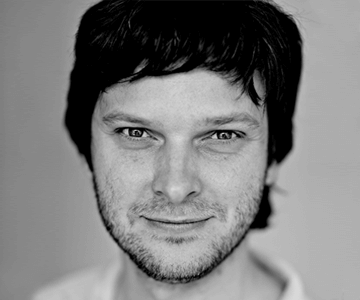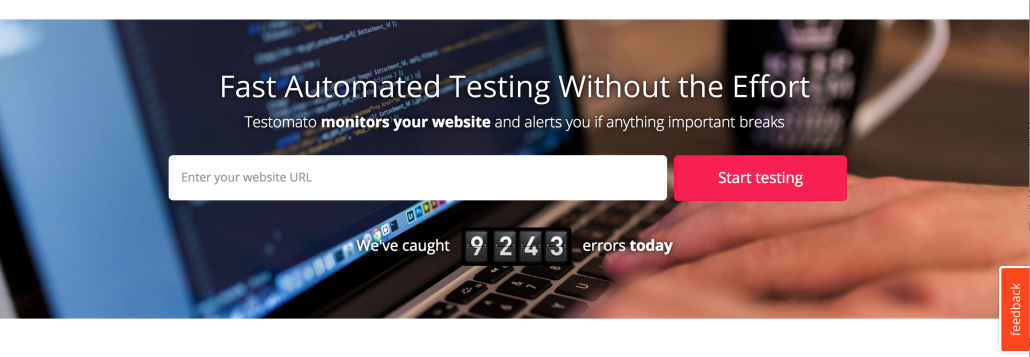Meet the StartupYard 2015 Startups: Testomato, a watch dog for your website.
When Testomato joined our program, it was with the understanding that they would be hiring a CEO to lead their team. Over the past 3 months, as we’ve gotten to know the Testomato team, and their new CEO Marcel Valo, we’ve become even more excited about the potential of this idea, and confident in their ability to bring it to a larger audience.
Testomato actively monitors and tests websites for errors and other issues that may interfere with normal operation, letting the site owner know almost instantly when an issue occurs. Simple tests can be set up and run continuously, ensuring that mission critical sites and services never go down unexpectedly. Testomato aims to be the leading watchdog for websites- a must-have tool for any revenue generating site.
Hi guys, tell us a bit about Testomato. What does the service do? Who is it for?
Marcel: In short, it’s a monitoring service for websites. It tells you when your website has a problem that may interrupt service or access for your visitors. It does a lot more than just monitor websites of course, but this is the core functionality: making sure your website is up and running properly at all times.
Testomato is for people like myself. In my corporate career, I have been responsible for marketing communications and for company websites, and I always had lots of problems to solve with those websites. Google analytics codes missing, time-outs, meta-tags just disappearing— there’s always something potentially wrong. And it took a lot of time to even notice a problem, much less correct it. Now with Testomato, I would be able to set up a simple automatic test, and know about any problem that arises within five minutes. That’s incredibly valuable when you have a mission critical website to maintain.
Where did the idea for Testomato first come from? How did the company get started?
Honza: It was originally an idea from one of the founders- Michal Illich [StartupYard investor and founder of Wikidi]. We were struggling with setting up Selenium to test a few projects. We wanted something that would quickly and easily verify that a site, and all its components, were online and working.
It took a lot of time to configure and maintain, and many false alerts were reported. The time invested was really not worth the problems we experienced. But we still needed this kind of monitoring, so we came up with a simple solution for monitoring and supervising our other projects.
Marcel: My business partner Michal Illich wanted a very easy to use, but also complex and in-depth tool for monitoring his company projects. Testomato was the result of that. While it ran as a sort of side project for Illich and Wikidi for about a year, it became moderately popular among a group of web developers. While a lot of people had signed up and were using the service, Testomato still struggled to find a paying audience or a way to monetize properly. I was brought on board quite recently- only after Testomato joined StartupYard, and together we’ve been working on shifting our business model towards e-commerce, helping online retailers to make sure they aren’t losing business due to site outages and other problems.
Is this a competitive space already? What are some alternatives to using Testomato for website monitoring and testing?
Marcel: There are a number of alternatives on the market. But they’re all either too simple, making them useless for monitoring a high value site, or too complicated to use. Some of the existing solutons allow you to monitor and control whatever you want, but they’re so time consuming, that nobody buy an IT specialist or a developer would bother with them. We are developing a tool that many different stakeholders can use effectively, from marketing, to IT, to QA departments, to ensure that they aren’t missing major site failures.
You’ve made some significant changes to your business model since joining StartupYard, can you tell us more about your current direction?
Roman: One of the realizations we’ve made is that business owners like to use Testomato as a quick and simple tool keep track of the work of their developers. There are so many things to potentially keep track of on a site, that it can be impossible to do it manually.
Marcel: Well, we’ve made a lot of changes, as I’ve mentioned. A lot of changes still lie ahead.
Our target group has shifted from developers, to people with online businesses, and e-commerce sites. Testomato could be used by a marketing head to track campaigns, for example, or by an IT department to alert them to failures in a high-value site, like an e-shop with hundreds of transactions an hour. When your business depends on your website being reliable, 24/7, and processing hundreds of transactions, a simple error can cost you thousands of euros.
A site like that can’t afford a lot of unscheduled downtime- nor can any high-traffic site or page that generates revenue. We had to shift our pricing accordingly, because this new target group has different needs and expectations. We find that this group needs more comprehensive testing on just a few sites, which means much more work on our end, coupled with a very straightforward and intuitive user interface.
What are some of the functionalities and services you plan to offer in the near future?
Marcel: Right now we are talking about locations. Because Testomato monitors, checks and tests your website from the outside, we can also play the role of a test user. How does a site work from a particular location? Is it fast enough? Is it properly localized or not? Do all the plugins work in all locations?
We currently have two regions – Europe and the USA, and as a customer you cannot pick-up one, we still do it automatically. But this is something we plan to change. Many more sites and services now have to be location aware, and they have to function differently according to how users access them. Many site owners aren’t aware of how their services are functioning in different regions, and if they need to do more localization work. So that’s a key functionality we’d like to expand on.
Honza: Also we want to make design changes to help bigger customers configure their checks and projects more quickly. There is room for a lot of improvement, and we have a lot of feedback to work with. Making Testomato work well with a big website is a new challenge.
Tell us a bit about the Testomato team.
Marcel: We are a pretty happy team. We’re pretty quiet, compared to some of the other teams at StartupYard, but we’re happy too. Not many people right now – 2 developers, Roman and Honza, Monika, our product lead, and our lovely copywriter and social media specialist Elle. We have Irena, the link-builder, and me, the new CEO.
I should be leading the whole team, but because I’ve been with Testomato for just a few weeks, sometimes they are leading me. Thank you guys!
Honza: Marcel joined us a month ago and he is doing really great. He has already made several big decisions, so we could start implementing them and move fast. Many impasses were eliminated thanks to his experience.
I would say, and feedback from StartupYard and the mentors also confirmed this, that our team was not really ready to make the big decisions on our own. As developers, we just weren’t used to that kind of thinking, and we needed some help with direction. Since Marcel joined us, he has pushed us to move forward, and that’s really helped.
How do you plan to grow in the next year? What markets will you focus on in the near-term?
Marcel: We want to be a world-wide service, with strong added value for online businesses. For example, e-shops, banks or insurance companies could deploy Testomato on an ongoing basis, and save money consistently by spotting site failures as they occur.
But we’re also interested in web services and media agencies, because we can help them with many issues. If a web agency or media company knows about an issue before the client, that’s a good thing! Growth in total users might be slow for the near term, as we’re changing our focus, but we expect to grow our paying user-base substantially within the next year, and focusing on adding value for that group will help us get there.
Long term, what do you see as Testomato’s vision for the next 5 years?
Honza: We want to be even more active in searching for critical issues on a website. This means that Testomato won’t just test and monitor according to user requests, but also notify the user about possible security issues, problems with site ranking, even things like design and speed of loading for different locations and devices. There are a lot of points of failure for big websites, and they’re too many for any one person to monitor consistently. We want Testomato to be a much smarter and more engaging tool as well. Site testing can be boring, so it’s important that users see the value they’re being given.
Roman: Our ultimate goal is let you know about harmful issues on your website before customers even notice. We want to be a website watchdog, something like a security guard or a babysitter for your website.
Marcel: Testomato should start to be a synonym for monitoring and testing websites. It should be a “must-have,” like health insurance for the web. Something everybody knows about, and anybody who cares about their website will naturally use. That is my vision for the next 5 years.
Give Testomato a Try Today: Test Your Site in Seconds
Follow Testomato on Twitter at @Testomatocom









